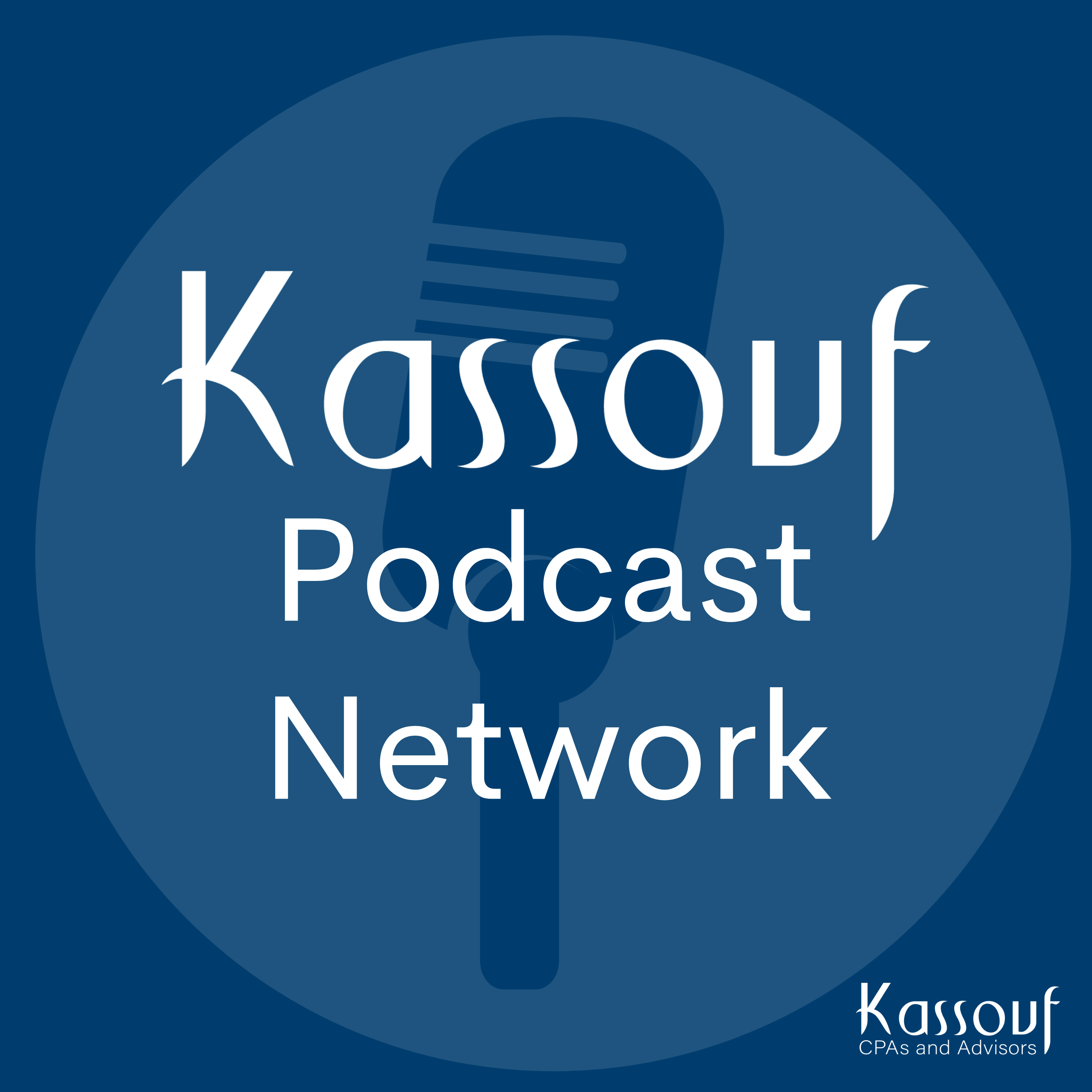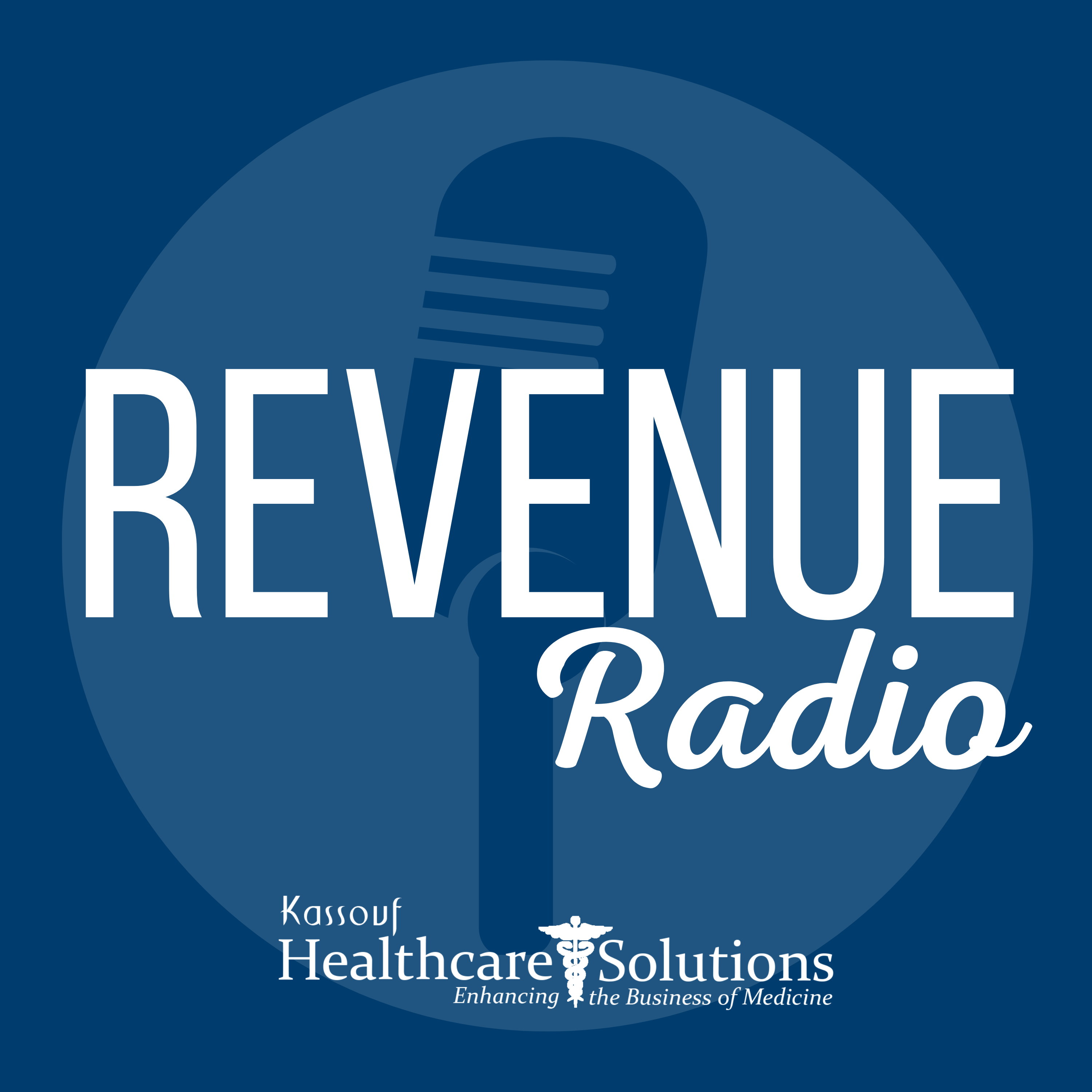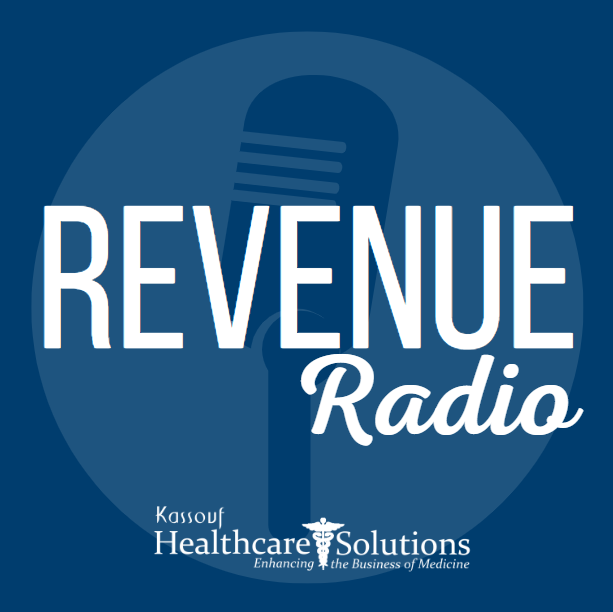Episode Transcript
Speaker 1 00:00:06 This is the Kassouf podcast network where your trusted advisors are at your fingertips or in your earbuds. At Kassouf, we are in accounting and advisory firm with a team of specialists in a variety of industries, everything from cyber security to healthcare consulting, to everything in between I'm Tara Arrington. And I'm your host as an ex journalist turned marketing professional, I'm the non-expert who will be chatting with our experts, giving you all the tips and tricks you need to help your business succeed. Today. We are joined by Jeff McGalliard. He is our leader of talent and career advancement here at Kassouf. Um, he leads team development and recruiting for the firm, ensuring our professionals have ample training and goal setting opportunities. And he also recruits our new team members. So welcome to the podcast,
Speaker 2 00:00:58 Jeff. Yeah. Thank you. Thank you for having me.
Speaker 1 00:01:01 So, um, today we're gonna be talking about a very, very timely topic that I know you have to face daily, Jeff, the great resignation and how, um, companies can basically try to combat this crazy change in the workforce. So if you just want to just chat a little bit about what it is and the challenges it brings you every day and other companies as
Speaker 2 00:01:25 Well. <laugh> um, how much time do you have <laugh>? Um, the grew resignation was caused, I mean, obviously it started with, with the pandemic, right? Um, but it was caused by lots of people just reevaluating, what was important to them and what they wanted to spend their days doing. Uh, during the pandemic, people were, were shutting their houses or wherever they were, and they had an opportunity to gain new skills while at the same time reevaluating what they would and wouldn't accept in their, their daily, uh, daily jobs or in their careers. And part of the change come from, you know, they, they wanted more from their employers or they just decided this isn't the right career for me. Or maybe they picked up a skill as a hobby and then decided I wanna make this full time. So you had this blend of, of conditions that, that led to people just completely changing career paths or altogether leaving the workforce.
Speaker 2 00:02:33 Mm-hmm <affirmative> we, you know, we saw lots of people just say, you know what, I'm just not gonna work anymore. They, you know, if they were part of a two income household and they could do that, or, um, a lot of stats were showing that some people were kinda at the end of their careers and on the edge of that cusp of retirement, it might have been planning to work four or five more years. And so there wasn't a plan in place mm-hmm <affirmative> for them to leave yet. There wasn't that transition plan, but once the pandemic hit, they just said, you know what, it's not worth it. I'm just gonna go ahead and call it quits now. Right? So you, you ended up with, with this, this talent shortage where there's essentially more job openings than there are people to fill 'em mm-hmm <affirmative>.
Speaker 2 00:03:19 So that's where, that's where the resignation comes in and, and combating that is a whole different, it's a whole different ballgame. Um, you've got some companies out there just throwing money at the problem, which will get people in the door sometimes. Um, but, or it might keep people there temporarily. But what I like to tell people is if you find yourself making a counter offer, they were pro there was a reason they were already looking at it, most likely wasn't money mm-hmm <affirmative>. So that comes down <affirmative> that comes down to, what else can you do other than just paying them more? Yes, you should pay them competitively, but what else can you do? Is it engagement? That's the hot topic, but what does that actually mean?
Speaker 1 00:04:08 Right. Um, so, you know, with thinking about companies constantly fighting for talent, I know you mentioned, um, you know, obviously money's important, important to most people, um, engagement, but you know, what are some other things, you know, in that recruitment process that you think is important for companies to, to show whether it's, you know, showing their culture, showing their people who they are, what, what are some things that, you know, you can kind of do in that process?
Speaker 2 00:04:39 Um, it depends on which group who your target market is that you're trying to recruit. But I think when you're trying to showcase your culture, um, you want to showcase what sets you apart from the, your competitors or the thousands of other employers they could go work for right now, you're not just competing against your local competitors anymore, right? Um, that's, that's a big recruiting challenges, especially for, um, smaller cities, for lack of better terms are competing with companies from major, major cities that have higher standard of living mm-hmm <affirmative>. And they can cut costs by hiring someone in, in an area with a lower standard of living, right. Which is a lower salary expense for them and an a salary increase for those individuals. So mm-hmm, <affirmative>, that's, that's become, um, a strategy that we're seeing a lot. But if you're looking for someone, you gotta keep in mind, you're competing with those people, but you also have to understand what it is they're looking for. What's important to them. Mm-hmm, <affirmative> how you can help them grow, how you can help them Excel in their careers, cuz nobody wants to be stagnant.
Speaker 1 00:05:56 That's right. Um, upward mobility, very important. Obviously I, I agree. Um, you know, showing that you can be how you can be successful here. I know that's something we talk about a lot when we were talking with the college students that we're also recruiting to, you know, get our, our new entry level accountants in here is, um, something we talk about that value proposition. So, you know, just chat a little bit about that and how we show, especially those younger, um, students, how they can be successful.
Speaker 2 00:06:25 So the, the younger generation or the, the generation that we're seeing coming out of college right now, um, the <affirmative> of course in broad strokes, it's, everyone's different, everyone's an individual, but in broad strokes, what we're seeing is they, they care a lot about, um, social responsibility, environmental responsibility, community involvement. Um, and they also like to be in charge of kind of in charge of their, their career path. They, they want the flexibility to cross, train and move horizontally if they want to. They want to kind of have that mm-hmm <affirmative> freedom in their future. Mm-hmm
Speaker 1 00:07:10 <affirmative>
Speaker 2 00:07:11 Yeah. So finding a way creating your value proposition is not, it's more about meeting them there. Mm-hmm <affirmative> not, not to say that you change up your company, but you find a way to meet them there more so than just presenting what you want to say about yourself.
Speaker 1 00:07:30 That's right. It's um, kind of, you know, something, something like that. I talk about a lot with, even with marketing is we're showing not telling, which I think kind of goes hand in hand with that with developing, you know, re recruiting and developing new employees.
Speaker 2 00:07:48 Right. Absolutely.
Speaker 1 00:07:50 Um, so thinking again about, um, you know, this mass talent shortage, trying to stand out in <laugh> this, this crazy world we live in, um, any, anything, you know, from, from, you know, your role. And then I know you're also involved with the local talent development association as well. And with those peers there, anything, you know, you think any like tips for any of our clients or business owners listening that you think they may can implement? Obviously not every company is the same, but any like quick tips you think they could try to implement to get talent in this crazy time,
Speaker 2 00:08:26 Um,
Speaker 2 00:08:30 Get, get involved with social media, me. Yeah. Connect with them there mm-hmm <affirmative> um, if you're, if you're trying to reach them through a job posting, you're probably not gonna have a lot of luck. There's so many job postings out there. There's so many ads that you're just gonna get drowned in the noise. My advice would be, be proactive, reach out to them, whether it be through, uh, professional societies, through networking, um, social media that everybody's on social media and it, it just comes across different than, than a job posting. So find ways to be proactive, reach out to them personally and, and make a connection there.
Speaker 1 00:09:16 Yeah, definitely. So anything that, um, you know, I haven't asked about that you think is important or anything, maybe people you think is a common misconception in this recruit, crazy recruitment time we're in,
Speaker 2 00:09:33 Um, going back to what we were saying about engagement, uh, I think, you know, it's employee, engagement's, it's a buzzword right now, everybody. Right. Everybody's trying to tackle employee engagement. There's billions of tons of software out there that you can use to try to measure it or, or improve it. But I, I don't think a lot of people understand what an employee engagement actually is. Mm-hmm <affirmative>, I mean, it's not the gimmicky stuff like ping pong tables and whatever in the office nap pop that's. Yeah. That's that, that's fun. Yeah. That's great. I mean, nothing wrong with that. It's fun, but that's not, that's not employee engagement. Mm-hmm <affirmative>, that's um, that's not gonna solve the, the larger problem. Mm-hmm <affirmative> um, when you look at actually engaging employees, you need to look at, um, perfect example, look at the hierarchy of needs. You've got the first two, first two needs should be met. If they're, you know, basic survival and safety mm-hmm <affirmative> needs, aren't met, you're
Speaker 1 00:10:36 Big.
Speaker 2 00:10:37 They need to start looking for another job, but I would hope those two are met. Um, but the last three, you know, sense of connection appreciation, and then, uh, the need to Excel, that's where you start to get employee engagement, you know, the connection with their, their colleagues appreciation from their employer. And then we were talking about earlier, they wanna be able to see their future. Right. And the ability to grow and Excel in their career. Mm-hmm
Speaker 1 00:11:04 <affirmative> yeah. So, I mean, it's it, like you said, it's more than just a ping bong table, right? Yes. <laugh>.
Speaker 3 00:11:10 Now, I don't know. I think there's somebody that was here in the last segment would disagree with that
Speaker 1 00:11:14 <laugh> yeah. So we had, um,
Speaker 3 00:11:16 You have to look at, I, I think it's a combination of all of the things. Once you have the employees here, it's got to also be an engaging place to be in a fun social place to be, right.
Speaker 2 00:11:23 Yeah. I mean, there's no wrong with that. I mean, that absolutely agree. It can be fun and it's, that's an event, not a strategy or it's a tactic, right? Yeah.
Speaker 1 00:11:33 Mm-hmm, <affirmative>, it's all part of a, a bigger picture, right? Yeah. It's just a piece of a big puzzle.
Speaker 2 00:11:38 Yeah, yeah. That you could call it, you can call that a tool versus
Speaker 1 00:11:44 The, the entire thing. Yeah. Right. It's yeah, I, yeah, I totally get that. I mean, you know, we are very fortunate to, to do fun things here. And I think that definitely helps with our engagement, but at the end of the day, um, me being able to go to my manager and talk to her about problems, I'm having tools I may need goals I have, and her always being receptive and supportive of those. That's the most important thing, right?
Speaker 2 00:12:13 Yeah, absolutely. That I think that's, that's almost a, a combination of the appreciation. Mm-hmm <affirmative>, I mean, there that's a blend of several that needs, you know, the safety, the psychological safety of being able to mm-hmm <affirmative> express concerns mm-hmm <affirmative> um, and then appreciation of, of your feedback. And mm-hmm <affirmative> that, that is a key, a very key component right now. I I'd always looking at new reports that come out for the state of talent, whether it be on the recruiting side or the retention side. And one of the last reports that I read said, the number one cause of turnover was managers mm-hmm <affirmative> and it was on, it was shocking in the eighties. I wanna say it was 82%. Mm-hmm <affirmative> of, um, people who'd jobs in the last career or last year said it was because of they're managers. Mm-hmm <affirmative>. So that, that connection with their manager and the, the feedback and appreciation at, from direct supervisors, whether it be managers, whatever level mm-hmm <affirmative>, um, has a huge impact on obviously the largest impact on retention.
Speaker 1 00:13:30 Right, right. Cause they say people don't leave jobs, they leave managers.
Speaker 2 00:13:33 Right. That's correct. Yes.
Speaker 1 00:13:36 Well, um, I think this is a great conversation, Jeff, and thank you so much for joining us on the Kassouf podcast network. Yeah,
Speaker 2 00:13:43 Absolutely.
Speaker 1 00:13:46 Thank you for tuning in to the Kassouf podcast network resources for today's episode are linked in the episode notes. Thank you to our producer Russ Dorsey and for Kassouf for powering this podcast, be sure to stay up to date on new episodes and more information about today's episode by following at Kassouf co until next time. Thanks for tuning in.


